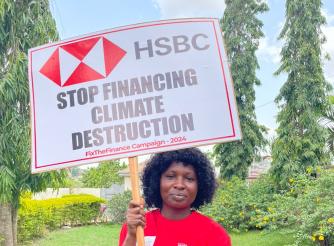East Africa Food Crisis: Ceel-Giniseed

The impacts of the current drought, which is threatening more than 20 million people in East Africa with severe hunger, can be deeply felt throughout Ceel-Giniseed. Since most residents are primarily farmers, they rely on selling onions, papaya, peppers, and mangoes at the market to sustain their livelihoods. Previously they grew maize and sorghum, but abruptly stopped once monkey flocks started sneaking onto their farms to steal the crops and destroy the land. Just like the community, their food supply has also been diminished by the drought.
Compounded with the lack of rain and the rising price of petrol needed for generators to pump water throughout the community, this has left the people of Ceel-Giniseed feeling like they've been brought to their knees by one of the worst droughts on record.
It’s clear that the climate has changed from previous years. Before it was very predictable. The community used to know when it would rain, what types of wind were expected, and even when there would be dry spells. But now everything is confusing and mostly grey: the sky is grey, the trees are grey, even the earth is grey. And the winds come both day and night with incredible force, often creating a volatile environment for both humans and the farm.
The drought has pushed most communities to migrate to the West in search of pasture for their livestock. Pastoralists who previously lived in Ceel-Giniseed have followed this path — the men will leave behind their wives and kids to stay on the farms while they search for a better life. But as certain members from this community move even further West, migrant communities from the East have found refuge in the barren land nearby. If the rains come, they will stay, but if the rains do not come they will move again.
Amina's story:
Amina, 80, is a resident of Ceel-Giniseed. She couldn’t recall the exact number of droughts she has lived through when we asked, but she shared that this drought is especially unique in how it is exacerbating already existing problems like hunger, lack of access to resources, and health.
“I did not get sick before the drought. The animals were good and there were no casualties. But now the food and resources are very scarce.
I blame the wars that are going on. They are the cause of all this - that fuel is expensive because of it. The crisis outside Somaliland is reaching here.”

But at the heart of this community is a group of strong women determined to ensure everyone makes it through another drought. The group existed before ActionAid started partnering with the community in 2014, though members expressed that conditions have significantly improved since they received unconditional cash transfers and seeds, trainings on farming techniques, and trainings on economic and political empowerment from ActionAid.
The women shared that the most important thing is that they all know each other now. In the beginning, when there was no group and they weren’t equipped with the skills they have since gained, they didn’t really know each other or understand how to support those in need. Now, when a new woman joins, it’s so much easier to integrate because they have built such a solid network. This depth of connection is critical for understanding internal issues women experience, their specific needs, and how they can support each other if someone falls ill or can’t care for their children. They also have their own savings to invest in health and nutrition and feel that the community is richly benefitting from their united front.
But with all the leadership and responsibility comes more stress. The women shared that they are consistently more worried than men about the drought and how it’s impacting their community, and fear the situation may become worse. They are taking more measures to support the household, take care of the children, maintain their small businesses selling fruits, and ensure the success of the farm. They are even buying livestock in town, bringing them back to use for short periods of time, then later reselling to the market so they can make money.

Six months ago, a migrant community left behind their shelter and personal possessions in search of food and water and walked 80km until they found Ceel-Giniseed. They were forced to leave because the conditions of the drought made their once comfortable life almost completely unlivable.
Previously, they had enough income from the sale of their goats and camels to take care of household needs and eat three times a day. But their livestock became very ill and the ones that they've brought with them cannot be taken to market as they are too weak to sell after being without food for so long, so the community is now displaced and survives off of rice and tea as their one meal each day.
Fathiya’s story
Fathiya, 20, is part of the migrant community in Ceel-Giniseed, and told us how drought has devastated her family’s life.
“In the past, we had a large number of animals. [The drought] has had a devastating effect on me personally. I became very weak. I felt powerless.
People were exhausted and other lives were lost. The animals are running out.
We left people and animals… everything was [taken] by the drought. We have fled from drought and famine.”

Within the migrant community of around 1,000 people, 20 are currently pregnant and are especially in need of nutrition and shelter. To make matters worse, 25kg of rice has risen 50 per cent from $20 to around $30 over the past month, while petrol has soared from $12 to around $30 for five litres.
This reality is putting stress on the original residents of Ceel-Giniseed who already have very limited resources, especially now with water. In order to access it, the community uses a generator fueled by petrol to pump the water throughout the area. In fact, the entire community is very reliant on petrol for many things, and they’ve reported that lately, prices have skyrocketed because of the war on Ukraine. Some food items such as rice and pasta, which they normally buy in the town, are now too expensive. Even the few workers they’ve hired to support them on the farm are asking for more money to survive.
The women in Ceel-Giniseed's women's group shared that they feel like first responders to the drought because they have been supporting this nearby migrant community with food and clean water. Throughout the country, there is a constant flux of migration fueled by the climate crisis, which seems to increase with each passing year, as reported by communities like Ceel-Giniseed. But still, they refuse to turn migrants away and will support them as much as they can, with hopes that at some point the government will step in. If the rains continue to fail, the migrants worry they will have to move again, because although water is much easier to access in Ceel-Giniseed, food is still an issue.
ActionAid has done a lot in partnership with this community. Several years ago we provided them with a generator to pump water from the shallow wells through pipes that both irrigate their farms and get water to the rest of the community and the livestock. But they need more support to improve their livelihoods, especially now. They shared that dams would be a helpful addition to their landscape to trap more water when it rains so that they can better support themselves and the migrant populations. Additionally, if they receive more solar panels, they can cut reliance on petrol and work to expand their production on the farm. Building resilient livelihoods in the face of climate change is critical for a thriving community.
Read about other communities living through the East Africa Food Crisis:


